|
You will receive power when
the Holy Spirit has come upon you; and you
shall be My witnesses
both in Jerusalem, and in all Judea
and Samaria, and even to the remotest
part of the earth.
~ Acts 1:7-8 ~
|
*
Every so often, a commentary comes to the attention of the
student of Scripture that strikes him or her as being head and shoulders
above the crowd. Steven Charles Ger's Acts: Witnesses to the World
has struck this editor and AMC's board secretary Mottel Baleston in just
such a way. For this reason, we have decided to present Acts in its
entirety - not just for the wealth of information that may be gained
from its study, but, as Mottel stated, as a model for how a Bible study
ought to be done. Links to previous increments of Acts:
Witnesses to the World
may be found in our
Library.
*
INTRODUCTION: BACKGROUND TO ACTS
Part 3 of 3
THEOLOGY OF
ACTS
As discussed above, Acts is not a
theological treatise. Nonetheless, a considerable
amount of theological points may still be discerned throughout the
narrative.
Theology
of the Bible
There are approximately thirty direct
quotations from the Hebrew Scripture and
innumerable allusions to those scriptures within the speeches of Acts.
Paul, Peter, James
and Stephen all quote the Hebrew Scripture to support and prove their
arguments that
Jesus is the prophesied Messiah.
There is speculation as to which translation of Hebrew Scripture was
used by the
early church. The Biblical quotations in Acts are primarily from the
Septuagint. The
Septuagint is the Greek translation of the Hebrew Bible (the Old
Testament), compiled in
the second century BC. There are slight discrepancies between the Hebrew
text and its
Greek translation, and the Acts quotations generally agree with
Septuagint variations.
This preference for the Greek translation may or may not indicate that
the Septuagint
was the translation of the Hebrew Bible utilized by the apostles. It is
possible that Luke
may have simply adapted the apostles' original Hebrew Bible quotations
to the version of
the Bible used by Theophilus and a subsequent Greek audience. By the
time Luke wrote
Acts, the locus of the church was no longer in Israel but, rather, was
in the larger, Greek-speaking, Gentile world.
Additional ambiguity is provided by the occasional correspondence of
some of the
Acts quotations to a version of the Hebrew Scripture found within the
Dead Sea Scrolls.
The Dead Sea Scrolls contain a Hebrew language version of the Biblical
books that
predates the standard Hebrew text by one thousand years. This version
also varies
somewhat from the standard Hebrew text. The discovery of these ancient
documents
creates the possibility that an alternate Hebrew version of Scripture
was in use in the first
century.
Ultimately, no conclusion may be drawn, based on this evidence, as to
which version
of Hebrew Scripture the apostles ordinarily read, although the
Septuagint is clearly the
primary source of Old Testament quotations in Acts.
Theology of God the Father
Acts portrays God as the sovereign
creator and preserver of the universe. He is, therefore,
the Father of all men, Jew and Gentile alike. As Sovereign, God is
actively engaged in
fulfilling His ancient promises to His people Israel as recorded in the
Hebrew Scriptures.
Many of those promises were fulfilled through the suffering, death,
resurrection and
exaltation of His Son, the Messiah (2:31-32; 3:22-26; 13:22-33;
26:22-23). Other
promises were fulfilled through His outpouring of the Holy Spirit (1:4;
2:17-40).
Additional promises concerning the messianic kingdom remain to be
fulfilled in the
indeterminate future.
Theology
of God the Son
Over the centuries, skeptics of
Christianity have made much of the claim that there is no
explicit statement in Acts that clearly identifies Jesus as God. They
reason that the lack of
such an explicit propositional affirmation is a strong argument against
the doctrine of
Jesus' deity. If the early church truly believed that Jesus was God,
then the glaring
absence of such a divine claim cannot be ignored.
Nevertheless, the lack of an explicit propositional statement in Acts
which
definitively equates Jesus with God does not mean that that doctrine is
absent from Acts.
This is, after all, not a book of propositional affirmations, but a
narrative account of how
Jesus is demonstrably the "Lord of all" (10:36), continually identified
with God. Luke
primarily establishes Jesus' divine identity by means of the signs and
wonders performed
in his name by His emissaries. More eloquently than any mere statement,
it is these
miracles, studded throughout the Acts narrative, which confirm that
Jesus is God.
In light of the portrait of Christ drawn by Luke, a direct propositional
statement
affirming Christ's equality with God would have proven redundant! This
is abundantly
evident when systematically collating all that is stated about Jesus
within Acts. To list
two examples, Luke interchangeably uses the terms, "Holy Spirit" and
"Spirit of Jesus"
(Acts 16:6-7) and in conversation, Paul equates the shed blood of Jesus
with God's own
blood (Acts 20:28). While not propositional statements, per se, they
obviously express
Jesus' deity to all with eyes to see.
Another way Luke compellingly and persuasively presents Jesus' deity is
through the
terms His church uses to describe him. A fascinating exercise, both
educational and
devotional, is a systematic analysis of precisely what the apostles and
others preached
concerning Jesus. The advanced christology of Acts is often overlooked.
Other New
Testament sources are often favored by theologians. Our contemporary
theology of Jesus
is overwhelmingly influenced by Paul's epistles primarily and by the
gospels secondarily.
Yet, an examination of the sermons of the initial followers of Jesus
often yields
surprising results.
For example, the particular christological emphases of Peter are often
different from
that of Paul, although there is also overlap between them. In addition,
what the speakers
choose to emphasize about Jesus is often dependent on the particular
audience they are
addressing at the time.
It comes as no surprise that the vast majority of the terms and concepts
used of Jesus
in Acts derive from the Hebrew Scripture. Quite naturally and
intuitively, the apostles
almost exclusively use Jewish categories and terminology in speaking of
Jesus' identity.
They extensively quote and make allusion to a plethora of messianic
prophecies and
covenantal promises. In turn, their Jewish audiences, culturally
saturated in the
Scriptures, would have been highly attuned to both the apostle's
christological
terminology and its originating Scriptural referent.
When addressing the Gentiles, both Peter and Paul must stretch beyond
familiar
Jewish, biblical terminology, and describe Jesus by using universal
categories and
concepts that could be grasped by their audience. Most Gentiles were
unfamiliar with the
Torah or Hebrew prophets, so it would have been less effective to quote
Old Testament
promises than to relay the basic life story of Jesus and His
resurrection.
The following discussion will focus on "who said what to whom" about
Jesus,
concentrating on the primary preachers: Peter, Paul, Stephen and Philip.
Luke's own
narrative voice will be omitted, as will the numerous unqualified,
"plain vanilla"
references to Jesus. The emphasis will be on the context and not on
individual word
counts.
CHRIST, JESUS CHRIST: Of course, the vast majority of references to
Jesus are in
his capacity as the Christ, the Messiah, the anointed one, the promised
representative of
God who was sent to deliver His people. It must be remembered that
although seemingly
used in certain instances as a "last name" for Jesus, in reality,
Christ
is his title and
office.
Christ is an all-weather term for Peter and He uses it with all
audiences. He uses Christ, and the specific God's Christ and Israel's Christ when
evangelizing Jewish
crowds in the Temple (2:31; 3:18; 3:20) and Jesus Christ when healing a
Jew (9:34) and
witnessing to a Gentile (10:36, 48). On occasion, Peter emphasizes the
full authority of
the name, Jesus Christ the Nazarene, when healing the lame man (3:6) and
defending
himself before the Sanhedrin (4:10).
To Paul, Jesus is simply Christ when debating or preaching to Jews
(9:22; 17:3; 18:5)
and Agrippa II (26:23). He specifies Jesus Christ when exorcising a
demon (emphasis on
the name [16:18]) and Christ Jesus (emphasis on the title) defending
himself to Felix
(24:24).
Christ is used by the apostles when teaching in Jerusalem (5:42), by Apollos in
witnessing to Jews (18:28) and by Phillip witnessing to Samaritans
(8:5). Philip also uses Jesus Christ with the Samaritans (8:12).
The more abstract conceptual God's Anointed is substituted for the title
of Christ, on
two occasions: during Peter's witness to the Gentiles gathered in
Cornelius' home (10:38)
and while the apostles are praying (4:27).
LORD JESUS, LORD JESUS CHRIST, LORD AND CHRIST, LORD OF ALL: As
Acts emphasizes that Jesus is the Messiah, it also stresses Jesus'
lordship. When Peter,
Paul and their associates use Lord in reference to Jesus, they most
assuredly do not mean
to communicate its pedestrian sense of "sir" or "master." From the very
beginning, the
apostolic witness was that Jesus is appropriately to be identified with
the Lord God
himself. Jesus rules with God and possesses divine authority over
salvation and
deliverance from sin.
Lord Jesus (1:21; 15:11) and Lord Jesus Christ (11:17) are terms Peter
uses when
addressing Jewish believers. Peter's unique combination Lord and Christ
is used in
Jewish evangelism and portrays Jesus as God's co-regent, intimately
sitting in God's
presence and ruling over creation with Him (2:36). His equally
distinctive Lord of All is
used in his groundbreaking evangelistic encounter with the Gentile
family of Cornelius to
demonstrate that Jesus freely exercises God's authority over all
creation (10:36).
Paul also uses the compound Lord Jesus Christ in his witness to both
Jews and
Gentiles (20:21; 28:31). His Jewish evangelism is also characterized by
his recognition
that Jesus is simply the Lord (9:28; 22:19)
The way the familiar Lord Jesus is used by Stephen, immediately prior to
his
martyrdom (7:59-60), praying for Him to "receive his spirit," is the
strongest indication
of Jesus' deity in Acts. The term is widely used throughout the
narrative. Lord Jesus is
employed by Paul in his witness to his Gentile jailer (16:31) and when
addressing the
church (20:24, 35; 21:13), by Philip in his Samaritan witness (8:16), by
Ananias when
first meeting Saul (9:17), and by the church at Antioch in their Gentile
witness (11:20).
JESUS THE NAZARENE, JESUS OF NAZARETH: This title squarely locates Jesus
within historic time and geographic space. In addition to the
aforementioned use by Peter
of the authoritative Jesus Christ the Nazarene (3:6, 4:10), Peter uses
the simpler Jesus
the Nazarene at Pentecost (2:22) and Jesus of Nazareth with Cornelius
(10:38). Paul
uses Jesus of Nazareth before Agrippa II (26:9).
RESURRECTED ONE: This designation is a not a name or title, but rather a
concept
which is consistently applied to Jesus. The apostles were witnesses of
Jesus resurrection,
and this idea is heavily emphasized by both Peter and Paul in a variety
of contexts.
For Peter, Jesus as the Resurrected One was incorporated into his
witness to Jews
(2:24, 32; 3:15), Jewish leadership (4:10) and Gentiles (10:40). For
Paul as well, this
concept was part of his commissioned witness to Jews (11:30; 17:3),
Gentiles (17:18, 31),
and kings (26:23).
CRUCIFIED ONE: Related to Jesus' resurrection was, of course, his
crucifixion.
This concept was an essential component of the gospel witness of Peter,
Paul and
Stephen. Peter included Jesus as the Crucified One when evangelizing
Jews (2:23, 36)
and Gentiles (10:39) and when accusing the Sanhedrin of Jesus' murder
(4:10). Stephen,
as well, reminded the Sanhedrin of Jesus' crucifixion (7:58), and Paul
incorporated it into
his Jewish evangelism (13:28).
PROPHESIED ONE: Vital for both Peter and Paul was the fact that Jesus
was the
fulfillment of the Hebrew Scriptures' messianic prophecies. Peter
underscores this point
with both Jews (3:24) and Gentiles (10:43). Paul follows that same
pattern, with Jews
(13:23, 33-37; 17:3; 28:23) and before Agrippa II (26:22).
SERVANT OF THE LORD: The mission of the Servant of the Lord is the
dominant
theme of the second half of the prophet Isaiah's writing. God called
this servant to restore
the nation of Israel and to be a light to the nations. Peter applies
this complex of
prophecies to Jesus while preaching in the Temple courts (3:13, 26).
Philip does so as
well while studying Isaiah with the Ethiopian (8:35). The apostles
reference this title for
Jesus during prayer (4:27, 30). In addition, the narrative of Acts, like
the gospels, is
studded with allusions to Jesus' fulfillment of the Servant of the Lord
passages.
SUFFERING ONE: One of the most powerful messianic prophecies highlighted
in
Acts is that of the suffering servant (Is. 52:13-53:12), the one who by
dying, would make
intercession with God on behalf of Israel. This concept of a prophesied
suffering messiah
relates to the titles Crucified One, the Prophesied One and the
Servant
of the Lord. Peter
emphasizes the suffering of Jesus in his Jewish witness (3:18), as does
Paul, who also
uses the phrase in his Jewish witness (17:3), as well as before Agrippa
II (26:23).
DELIVERER FROM SIN: This is presented in Acts as one of the key
functions of
the Messiah: the ability to forgive sin. This concept is integral to
Peter across the board,
whether witnessing to Jews (2:38; 3:19) Gentiles (10:43) or the
Sanhedrin (5:31). Paul
refers to Jesus as the Deliverer from Sin and confidently places Jesus
above the Torah
(13:38-39).
RIGHTEOUS ONE: Just as with the Crucified One, this is a messianic term
that
Peter, Paul and Stephen all reference. The term originates in Isaiah's
Suffering Servant prophecy (53:11) and is the result of the Servant of the Lord having
become the Suffering and Crucified One. This term would have particularly resonated
with the
Jewish audiences of Peter (3:14), Paul (22:14) and Stephen (7:52).
SAVIOR, ONLY SAVIOR: Although a focus on the term Savior has been
fashionable within the evangelism of our contemporary churches, the
relatively restricted
use of Savior by the apostles is surprising. Within Acts, it is but one
facet among many of
Jesus' identity. This suggests, perhaps, that our contemporary view of
Jesus' identity is
not as muscular as was the first century church's. While standing before
the Sanhedrin
for the first time, Peter calls Jesus the Savior (4:12) and on the
second occasion, he
emphasizes that Jesus is the Only Savior (5:31). Paul uses this title
while witnessing in
the synagogue of Pisidian Antioch (13:23).
PROPHET LIKE MOSES: Peter's preaching was distinctively steeped in the
messianic prophecies of the Hebrew Scripture. In Acts, only Peter, the
apostle to the
Jews, explicitly draws the important connection between Jesus and the
promised Prophet
Like Moses (3:22). Stephen quotes the prophecy, but does not explicitly
make the
connection to Jesus (7:37). Perhaps he would have further developed his
argument had
the Sanhedrin not executed him.
SON OF MAN: Although by far the most popular self-designation of Jesus
in the
gospels, this profoundly messianic title is only used once in Acts, by
Stephen, just prior
to his execution at the hands of a Jewish mob (7:56).
ADDITIONAL DESIGNATIONS USED BY BOTH PETER AND PAUL: Both
Peter in the Temple (2:30) and Paul in the synagogue (13:33) make
identical arguments
that Jesus is the Messiah based upon His being the prophesied Son of
David.
In those same Jewish contexts, Peter (3:26) and Paul (13:23) both
emphasize that
Jesus was specifically Sent by God to Israel. In addition, both of these
men identify Jesus
as the fulfillment of King David's prophecy (Ps.16:10) that the Holy One
of God would
be resurrected (2:27; 3:14; 13:35)
Jesus' humanity was highlighted by His being called a Man by Peter in
his Jewish
witness (2:22) and Paul in his witness to Gentiles (17:31). Finally,
both apostles
incorporated into their Gentile evangelistic message that Jesus was soon
to serve as Judge. For Peter, speaking with Cornelius, Jesus would judge the "living
and the dead"
(10:42) and for Paul, addressing the Athenians, Jesus was appointed by
God to judge "all
mankind" (17:31).
ADDITIONAL DESIGNATIONS UNIQUE TO PETER: Peter emphasizes to both
Jews (2:22) and Gentiles (10:38) Jesus' abilities as a Miracle Worker.
He shames his
Jewish audience when he reminds them that this awesome Prince of Life
(3:15; 5:31),
Jesus, was their Disowned One (3:13). Peter boldly proclaimed before the
Sanhedrin
(4:11) that although Jesus was the messianic psalm's Rejected Stone (Ps.
118:22),
despised by His own people and executed by their leadership, He was
accepted by God
and raised up to reign as the Exalted One (2:33; 5:30:31), as the angels
initially
announced at Jesus' ascension (1:11).
The angels also announced that Jesus would soon be the Returning One
(1:11), and
Peter boldly broadcast to his people that this Jesus would return to
Israel to establish His
promised messianic kingdom (3:20).
ADDITIONAL DESIGNATIONS UNIQUE TO PAUL: Paul's initial preaching
within the synagogues is characterized by his powerful proclamation that
Jesus is the Son
of God (9:20; 13:33). His later preaching is likewise characterized by
his unique
designation of Jesus as the messianic Hope of Israel (28:20).
Table 5. Content of what was Preached about Jesus
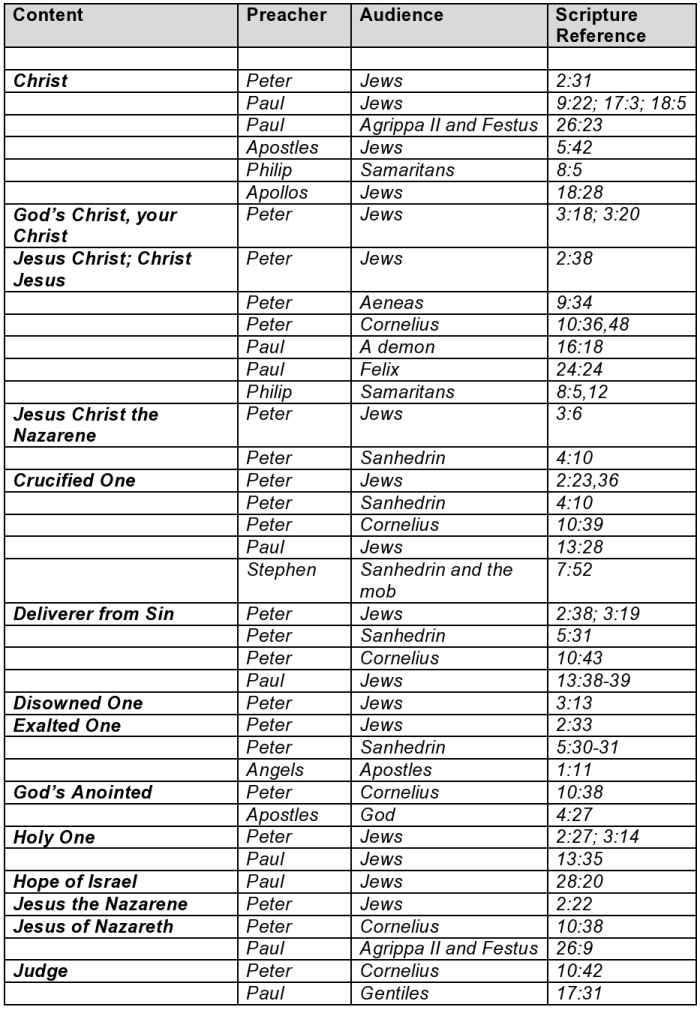
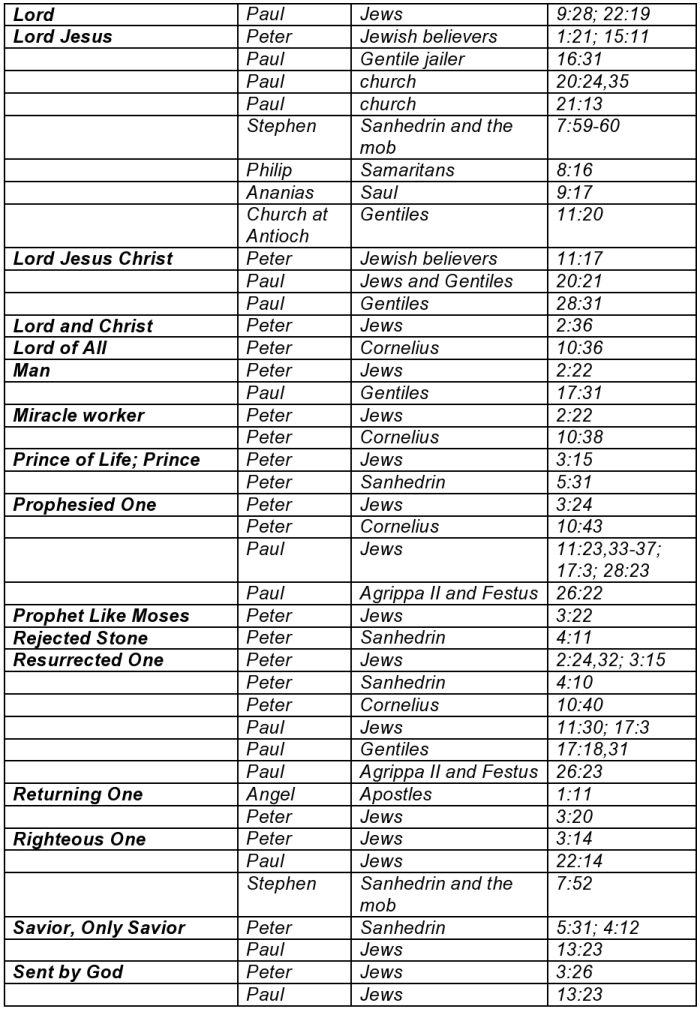
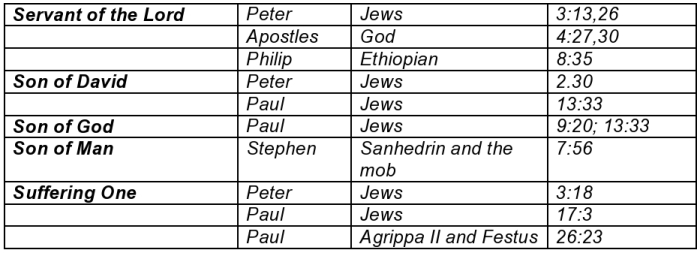
Theology of the Holy Spirit
Luke reveals a great deal concerning
the Holy Spirit's active ministry in the life,
guidance and expansion of the church. For Luke, the Holy Spirit, the
"promise of the
Father" (1:2, 2:33), was God's gracious gift (2:38, 5:32; 8:18; 10:45;
15:8; 19:2). The
pouring out of this gift upon believing Jews and Gentiles (2:17; 10:45;
18, 33) was
understood by the church to be the "baptism of the Spirit" (1:5; 11:16).
An alternate
phrase that describes Spirit Baptism is "to receive the Spirit" (2:38;
8:15, 17, 19; 19:2).
The apostles' baptism of the Spirit at Pentecost marked the initiation
of the church age
(11:15).
Baptism of the Spirit is primarily experienced in Acts within a national
or corporate
context and is indicative of incorporation into the church of
identifiable ethnic or national
groups. This corporate baptism of the Spirit is accompanied by the
specific gifts of
tongues and prophecy (2:3, 10:44-46; 19:6). The Holy Spirit is the great
unifier and
equalizer in Acts, demonstrating that Jews and Gentiles alike have an
equal role in God's
program and an equal place in His community.
Alternatively, the Holy Spirit's ministry to individual believers is
primarily that of the
"filling (controlling) of the Spirit" (2:4; 4:8,31; 6:3-5; 7:55; 9:17;
11:24; 13:9,52). In
Acts, believers speak by means of the Spirit (1:2; 4:31; 8:29; 10:19;
11:28; 13:2; 20:23;
21:4,11), and the Spirit directs and appoints them in ministry (8:29,39;
10:19; 11:12;
13:2,4; 15:28; 16:6-7; 20:28; 21:4). He also comforts the church (9:31)
and is the divine
collaborator with the authors of Scripture (1:16; 4:25; 28:25).
The Holy Spirit in Acts was also a participant within the ministry of
Jesus in several
ways. Jesus spoke by means of the Spirit (1:2), received the promise of
the Spirit (2:33)
and was anointed by the Spirit (10:38). The Spirit also bears witness of
Jesus (5:32).
Theology
of Angels
Angels play a crucial supporting role
in the advancement of the gospel and the expansion
of the early church. In Acts, angels are portrayed as God's servants,
messengers and foot
soldiers who relay divine instruction (1:10-11; 8:26; 10:3-7; 27:23-24),
defend and
protect God's people from harmful circumstances (5:19; 12:7-10, 15), and
execute God's
judgment on His enemies (12:23). See Table 6.
Table 6. Angelic Activity in Acts
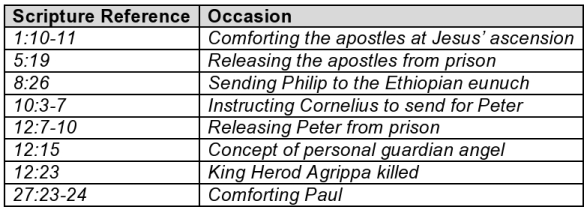
Theology of Satan and Demons
Demons are far less predominant in
Acts than in the gospels. In Acts, demons are a cause
of disease (5:16; 19:12), possess individuals (16:16) and may only be
exorcised by
legitimate believers in Jesus (16:18; 19:15). The sole reference to
Satan indicates that
Christians may be satanically influenced and even controlled (5:3).
Theology
of Man
Paul's address to the scripturally
illiterate Athenians affirms that each man is created by
God (17:24) and descends from Adam (17:26).
Theology
of Salvation
The apostles in Acts neither pull
punches nor mince words when it comes to the gospel.
They are constantly portrayed as preaching that Jesus is the exclusive
means of salvation
(4:12). Luke's "good news" is that Jesus is God's only authorized agent
of salvation for
both Israel and the nations, Jews and Gentiles alike. Sinners may only
find forgiveness
through belief that Jesus is the divine forgiver of sin (Acts 13:38-39).
When the apostles are shown preaching the gospel, their emphasis is not
focused on
theological details, the specific "ins and outs" of what Jesus had
accomplished and
exactly how He had accomplished His work of salvation. The apostles
simply call for a
response to the prophesied, resurrected and exalted Messiah. Luke's
account is much
more focused on the person of Jesus than on His work. For a detailed,
systematic analysis
of exactly how Christ's death on the cross eradicated the power of sin
and death, one
must look to the epistles of Paul, not the adventures of Paul.
Theology
of the Church
The advance of the church is the main
subject of the book of Acts. Luke depicts the
universal church of all believers (5:11; 9:31) as well as individual,
local churches (8:1;
16:5; 14:23; 13:1; 20:28).
The church, while birthed in Israel and incorporating the faithful
remnant of Israel, is
not a continuation of Israel. Acts traces the Jewish leadership's
developing antagonism
from initial suspicious rivalry (4:1-2) through its culmination into
aggressive hostility and
murderous intent (7:58; 8:3; 12:2; 25:2-3). The church stands apart as a
distinct
community from Judaism and Israel, which incorporates Jewish, Samaritan
and Gentile
followers of the Messiah on an equal basis. This Messiah is both the
hope of Israel
(28:20) and the Lord of all (10:36).
Acts highlights church participation
in two ordinances, baptism and communion. As
demonstrated throughout, baptism is by means of some level of immersion
in water and
is only designated for believers (2:38, 41; 8:12, 13, 16, 36-39; 9:18;
10:46-48; 16:33;
19:1-6; 22:16). Although participation in the eucharist is not described
in Acts, allusion is
made to the ordinance (2:42, 46; 20:7, 11).
Theology
of End Times
Acts explicitly affirms the doctrine
of the "second coming," that Jesus will return again,
this time to rule and reign (1:11, 3:19-20). The church believed that
the "last days" had
been initiated by the outpouring of the Spirit on Pentecost (2:17) but
while the Messiah's
return was imminent, it would not be immediate. We find in Acts a sort
of "tempered
imminence;" an expectation of Jesus' imminent return, balanced, or
tempered, by His
commissioning His apostles to evangelize the entire world. Rome was not
built in a day
and, according to Luke, neither was Rome reached before twenty-nine
years had passed.
When the Messiah returns, He will be the harbinger of Israel's
restoration (1:6; 3:21)
and corporate salvation (2:16-21). In addition, with Jesus' return will
also come His
judgment of all humanity (17:31).
Theology
of Israel
Acts is particularly instructive in
areas pertaining to the Jewish people and the nation of
Israel. Almost two thirds of the narrative takes place within the land
of Israel, and the
church's membership was exclusively Jewish throughout the first seven
years of its
history. Concerning the people of Israel, Luke affirms the following:
First, through the agency of her leaders, Israel corporately rejected
Messiah.
Therefore, judgment is imminent for that generation (2:22-23, 36;
3:13-18; 4:10-11).
Second, the eventual establishment of the messianic kingdom is a future
certainty
(1:6; 3:21). The kingdom is predicated upon Israel's corporate reception
of their Messiah,
at which point He will then return to rule and reign (3:19-20).
Third, the gospel has particular resonance and is especially applicable
to Jewish
people (Rom. 1:16). The early church prioritized Jewish evangelism. This
is true both
historically/chronologically, as the church expanded its geographic
borders, and
methodologically, as standard and sustained evangelistic strategy (13:4,
14; 14:1; 16:11-13; 17:1-2, 10, 16-17; 18:1, 4, 19; 19:1, 8; 28:17).
Fourth, it is perfectly appropriate for individual Jewish believers to
maintain Jewish
customs and traditions (3:1; 21:26) so long as the observance of those
customs and
traditions is not viewed as obligatory for other Jewish or Gentile
believers (15:1-29). No
Jewish customs or traditions contribute to salvation; it is faith alone
that saves both Jew
and Gentile (Rom. 1:16; Eph. 2:8-9). However, it is incumbent on all
Jewish believers, as
Jews and thereby heirs of the covenant promises made to Abraham, to
observe
circumcision (Gen 17:1-22; Acts 16:1-3). Such observance predates Moses
and Torah
and is for the purpose of identification as an heir and recipient of
God's national promises
to Israel inherent within the Abrahamic Covenant.
Finally, in every case, the use of the term Israel within Acts refers to
national, ethnic
Israel. Luke uses the term on twenty occasions. On no occasion does Luke
use Israel to
designate the church. The concept of the church being a "spiritual
Israel" is as foreign to
Luke as it is to the rest of the New Testament. The fallacious concept
that the church has
displaced Israel from future enjoyment of as yet unfulfilled divine
promises made to them
of national salvation, possession of the entirety of the promised land,
and a glorious messianic national kingdom, is nowhere to be found in
Acts (see Table 7)
Table 7. Use of the Term Israel in Acts
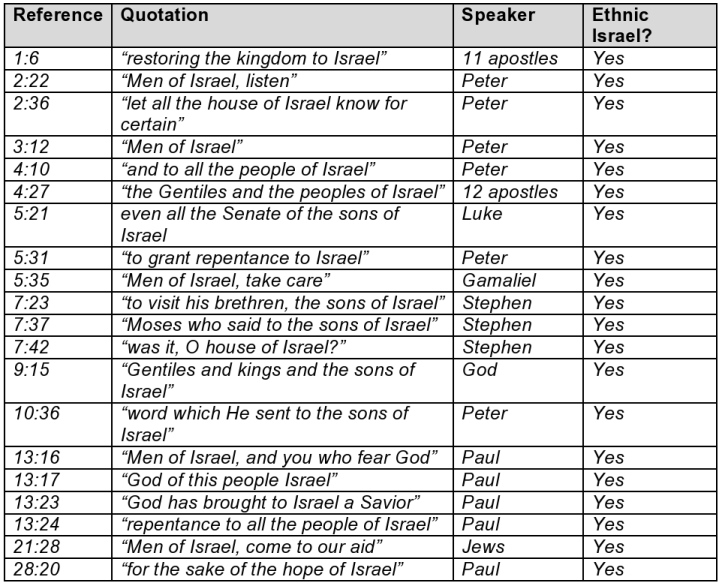
STUDY
QUESTIONS
Continued from previous installment of
Acts:
Witnesses to the World:
6. List ten titles or designations of your choice given to Jesus in
Acts.







